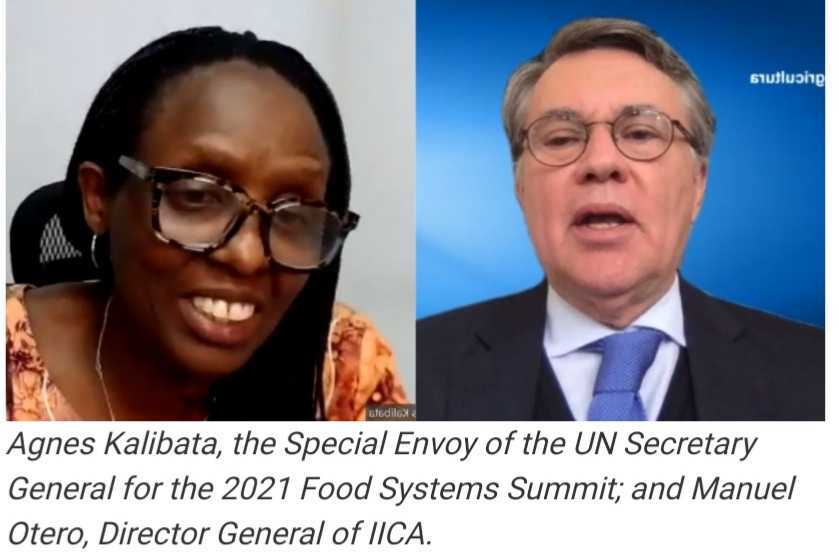
San Jose, 1st March, 2021 (IICA). Agnes Kalibata, the Special Envoy of the UN Secretary General for the 2021 Food Systems Summit, held a joint video conference with the Director General of the Inter-American Institute for Cooperation on Agriculture (IICA), speaking with more than 15 journalists from Latin America, the Caribbean, the United States and Spain. She discussed the significance of the global event that is seeking to lay the groundwork for positive changes in food production and consumption.
Kalibata emphasized that the Summit, which will take place at the end of September, is aiming to ensure the provision of safe and nutritious food for all; a shift towards sustainable consumption patterns; improved nature-positive production; the advancement of equitable livelihoods and distribution of value; and the building of resilience to climate vulnerabilities.
She therefore urged journalists to widely disseminate these messages to ensure that all people in the world are clear about what is at stake.
“It all comes together in one plate, in which we are trying to make sure that the food we eat is healthy for our bodies, is healthy for the planet, and advances the well-being of mankind. I invite you to join me in encouraging people to look at what is at stake. Food systems definitely contribute to our food and health, but they are also becoming a challenge from the economic and climate change perspective”, pointed out Kalibata.
The UN Secretary General’s Special Envoy stressed that, “We cannot pretend that these things are not happening or turn a blind eye and look away, assuming that these challenges do not exist. We cannot say there are no people that are living in hunger, when we have so much food that is being produced; and Covid-19 has escalated these problems, making the situation more complicated than before”.
Kalibata explained that the 2021 Food Systems Summit is not trying to “negotiate anything beyond the millennium goals”, but it is calling on science to analyze matters that are coming forward as possible solutions and engaging in dialogue at the local level in more than 100 countries prior to the crucial event, given that food systems cannot be globalized. They have country-specific differences and contexts, and it is at the national level where many of the requisite solutions for their transformation should arise.
“I am a faithful believer in science”, she said, “and in how policy can change society; they are closely related. Policies that are science-based and agile, can be scaled up to assist millions of people; and technological advancements can solve problems”, she specified.
During the conference, which also included the participation of decorated scientist, Ohio State University Professor and 2020 World Food Prize laureate, Rattan Lal, the Special Envoy stressed that trade barriers that are not based on science or environmental concerns affect food security. Thus, the Summit’s role is also to “explain what we are doing, the health of people, access to food and the well-being of the planet; and to create an understanding on different levels that our actions in one part of the world affect another. And it’s the same thing with climate change”.
During the discussion, the IICA Director General underscored the opportunity that the 2021 Food Systems Summit represents for the Americas – a forum where its voice must be heard, given its pivotal role in global food security. As the major global food exporting region, it accounts for 13.8% of global food trade.
IICA is a member of the Summit Champions Network, one of the four main support structures of the global meeting.
Otero agreed with Kalibata on the importance of science to policy- and decision-making. He also emphasized the importance of allowing farmers a central role in the discussions, given that family farming represent the vast majority of total agricultural production units (approximately 75%) in the Western Hemisphere.
“We require sound public policies to generate private investments and to empower agricultural producers; that is key. We need to ensure that they can be extremely profitable, which is the only way that families can exist in rural areas, without degrading the soil, while adopting good practices and producing healthy and high-quality food for consumers. As such, we at IICA maintain that farmers should be our first concern; they are critical. We also agree that public policies should be grounded in science and in the notion that family farming is part of the solution and not the problem”, he added.





